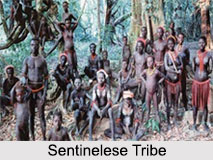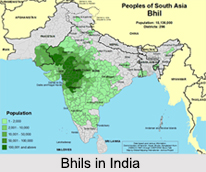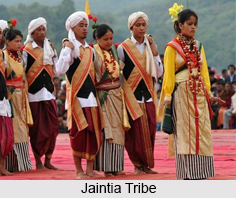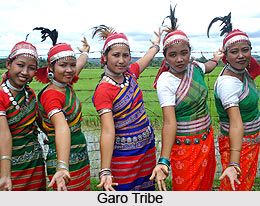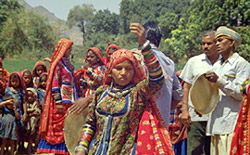About Chero Tribes
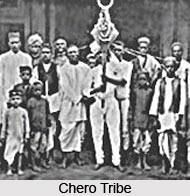 Chero Tribes is one of the major Scheduled tribes who are found in the states of Uttar Pradesh and Bihar in North India. They are also distributed in different parts of West Bengal and Jharkhand, especially Santhal Parganas and Palamu. The Chero have two sub-divisions, the Mahto and Chaudhary.
Chero Tribes is one of the major Scheduled tribes who are found in the states of Uttar Pradesh and Bihar in North India. They are also distributed in different parts of West Bengal and Jharkhand, especially Santhal Parganas and Palamu. The Chero have two sub-divisions, the Mahto and Chaudhary.
Origin of Chero Tribe
The Chero tribal community belongs to one of the non-Aryan tribal families related to Dravidian origin. The word "Chero" has been derived from the Sanskrit word "Chetak" or "Chedak" which signifies slave. The Chero tribe speak a language that is also called Chero.
The early history of this tribal group mentions that the Cheros of Jharkhand were descendants of the Chandravanshi Kshatriyas. Earlier they were a martial group and seized lands by their courage and valour.
Society of Chero Tribe
The Cheros are classified as a Scheduled Caste in most parts of Uttar Pradesh but are a Scheduled Tribe in Sonbhadra and Varanasi districts. They are also classified as a Scheduled Caste in Bihar.
Occupation of Chero Tribe
The Chero tribes are agricultural people. Their major crops are maize, paddy, mahua, etc. Apart from farming, they also practice animal husbandry, some are employed as labourers.
Religion of Chero Tribe
The Cheros follow a dual system of religion. Their religion is a combination of both traditional faith and Hinduism. Among them deities are worshipped by Kanaujia and Sakadwipi Brahmans. They are revered by the members of the tribe. The Cheros also have spiritual gurus who are Brahmans of Gharbari Gosains. These people also worship animistic deities like Dharti, Darha, Baghaut, Dwarpan, Dukhnahi, Chenri and others. Apart from worshipping these deities they also offer sacrifices to these gods in the form of fowls, goats, sweetmeat and wine. Usually the sacrifices are done in the month of Aghan to have a good harvest.
Like the upper caste Hindus the Cheros of Palamau have the right to perform the purificatory ceremonies. The census report of 1981 revels that 99.84% are followers of Hinduism and the rest are followers of Christianity. Many of the Cheros wear the sacred thread which the Brahmans wear during the time of their marriage. The Brahmans accept water from their hands and eat everything except rice that has been cooked by the Cheros. Here the Cheros are held in high estimation. On the other hand in the Chota Nagpur they are held in low regard. The Bhogtas consider the Cheros to be inferior to them and hence refuse to eat with them.
This article is a stub. You can enrich by adding more information to it. Send your Write Up to [email protected]
Marriage of Chero Tribe
The Cheros of Jharkhand practise endogamy at the community level and Exogamy at the clan level. Previously they practised early marriage of the girls but now the custom has almost come to an end. The Cheros largely practise Monogamy but Polygamy is also practised in certain cases. The affluent land owners at times face difficulty in searching for a groom for their daughters so as to retain their pseudo Rajput position in the society. The marriage patters and customs accord to the orthodox patterns but certain rituals establish their conformity with more ancient rituals. At the end of the `bhanwar` ceremony the married couple move around an earthen vessel placed under a bridal canopy of boughs. The bride then touches the feet of the groom and promises to be faithful to him throughout her life. Again after the groom applies the `sindoor` i.e. vermillion on the forehead of the bride, the bridegroom`s brother washes the feet of the bride and presents her the wedding jewellery. After the ceremony he next takes the palmauri from the pith head-dress worn by the groom and places it on the head of the bride. The Chero also practices another custom called as `amlo.` The ceremony consists of keeping a mango leaf in to the mouth and then crying and lamenting and during this time the maternal uncle of the groom or bride pours water in the leaf. This ceremony is performed by the groom`s mother before he leaves for the marriage ceremony and the bride`s mother after the procession arrives.
Although Polygamy is practised it is not much practised. Widow Remarriage is prevalent but it is not much favoured by the affluent Cheros. The widows are generally expected to marry their deceased husband`s brother or cousin. She is also allowed to marry someone else but only by abiding certain prescribed rules and regulations. Divorce between the couple is not allowed. A woman if found adulterous is discarded from the caste and is not allowed to marry again. Property is inherited by the sons and is equally divided among them. The eldest son inherits the family authority of his father and becomes the head of the family. Women on the other hand contribute in collecting food, fuel and also help in farming activities.

















